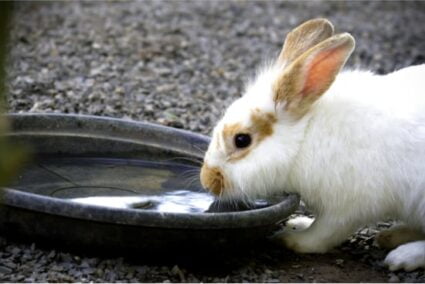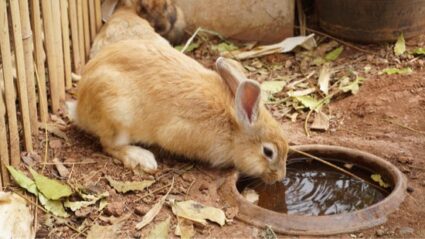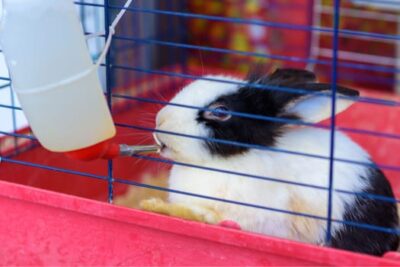A rabbit suddenly drinking lots of water can be concerning. Polydipsia, the medical term for excess thirst in rabbits, can occur for various reasons. Some conditions are more serious than others, so it’s imperative that you determine what’s causing it.
If it’s summertime, the need to drink extra water may be heat-related. Hot rabbits often drink lots of water to cool themselves down. Rabbits can also drink more while shedding or out of habit. It may be a medical condition such as diabetes, kidney disease, or dental problems.
We’ll find out how much water your rabbit should drink each day. We’ll also examine the symptoms that can occur alongside excess thirst, and what they mean. Finally, we’ll take an in-depth look at the causes of polydipsia in rabbits, and their treatments.
How Much Water Should My Rabbit Drink?
Rabbit owners sometimes become concerned about their rabbit’s drinking habits when they get a second rabbit. It seems that the new rabbit drinks a lot more, or a lot less, than the original bunny. But which rabbit is drinking the ‘correct’ amount?
Often, both rabbits are drinking no more or less than they need to. The right amount of water to drink in a day will vary for each bunny.
How much your rabbit should be drinking comes down to three main factors.
- Your rabbit’s weight
- Your rabbit’s lifestyle and personality
- Seasonal changes
Larger rabbits need to drink more water than smaller rabbits. They have bigger bodies, they eat and poop more, and they need more fluids to stay hydrated.
A healthy rabbit should drink roughly 50 to 150 milliliters of water per kilogram of body weight per day. For example, a rabbit weighing 3 kg (6.6 lbs) may drink between 150 ml and 450 ml daily.
How active your rabbit is can have a noticeable effect on their water intake. More active bunnies that run around all day will need to drink more than lazy bunnies.
Seasonal changes can also come into play. Rabbits usually drink more water while they’re going through their biannual shed. They’ll also drink more water during the warmer months of the year.
Some rabbits seem to be thirstier than others, even when accounting for the above factors. What’s normal for one rabbit may not be normal for the next. If your rabbit has suddenly started drinking more for no obvious reason, however, you should be concerned.
What are the Symptoms of Polydipsia in Rabbits?
Polydipsia is the medical term for excessive thirst in rabbits. It’s not a condition or disease in itself, but rather a symptom of an underlying problem.
The issue which is causing polydipsia in your rabbit could be medical. However, there could just as easily be an environmental or behavioral reason.
If you’ve ever thought “my bunny won’t stop drinking water,” then your rabbit most likely has polydipsia. But it doesn’t usually occur on its own, without any other symptoms.

If you notice polydipsia, keep a close eye on your rabbit and check for any other signs that something is wrong.
Polydipsia commonly occurs alongside polyuria. This refers to a rabbit peeing more than usual.
Rabbits usually produce between 120 and 130 milliliters of urine per kilogram of body weight per day. So, if your rabbit weighs 3 kg (6.6 lbs), they may produce between 360 ml and 390 ml per day.
It’s hard to estimate how much your rabbit is peeing. Look out for more frequent or longer trips to the litterbox. Your rabbit may also experience incontinence: a lack of control over when or where they urinate.
Some underlying causes of polydipsia can also cause more concerning symptoms, such as:
- Increased or reduced appetite
- Sluggishness and depression
- Fever
- Weight loss
- Defecating less than usual, or diarrhea
- Signs of pain, e.g., teeth grinding
- Behavioral problems, such as aggression
- Neurological issues, such as confusion or seizures
Any of the above suggest your rabbit has an underlying medical condition.
What Can Cause Excessive Thirst in Rabbits?
Two rabbits that are the same breed, age, and weight can have different drinking habits. Some rabbits seem to drink a lot, while others barely touch the water bowl.
So, don’t compare your rabbit too closely to other rabbits. It’s far more crucial to get to know your rabbit’s behavior. Watch for any changes, and other symptoms occurring alongside polydipsia.
If you still think that your rabbit is drinking too much water, it’s time to investigate the cause.
Figuring out what’s triggering polydipsia in rabbits can be difficult. This is because it can have so many different underlying causes.
Some explanations are trivial, and are a result of lifestyle changes. These are usually easy to spot, and simple to fix at home.
Occasionally, however, extreme thirst in rabbits can be a sign of a medical condition, such as a disease.
So, why is my rabbit drinking a lot of water? Here are the nine leading causes.
Dehydration
Though it may seem obvious, dehydration is often overlooked by rabbit owners. The reason your rabbit is drinking more than usual may be because they’re thirsty.
Rabbits can become dehydrated easily. Diarrhea is one of the main causes of dehydration, as it results in a huge loss of water.
To tell whether your rabbit is dehydrated, there’s a simple skin test you can perform.
- Gently take the skin on the back of your rabbit’s neck in your hand.
- Lift the skin upwards, so that it stretches out, though not to the point that causes discomfort.
- Open your hand and release the skin.
If the skin snaps back to where it was immediately, your rabbit is healthy and hydrated. If it’s slow in returning to its original position, your rabbit is dehydrated.
Rabbits can become dehydrated for many reasons, some of which we’ll discuss below. If you’re not sure why your rabbit is dehydrated, take them to a veterinarian.
Changes in Diet
Rabbits may not be fussy eaters, but they are sensitive to an improper diet. Dietary problems can be the root cause of many behavioral concerns, including dehydration, and therefore, polydipsia.
In terms of excess thirst, two main dietary issues could be the problem:
- Excess salt. Too much salt can dehydrate the cells of a rabbit’s body, by extracting water from them. This can cause rabbits to become extremely thirsty.
- Not enough vegetables. Along with unlimited hay, rabbits should eat a portion of veg the size of their head per day. Rabbits get a lot of water from their daily salad, so a lack of vegetables can trigger thirst.
Try slowly upping your rabbit’s veg intake, but watch for signs of diarrhea. And if your rabbit has a salt lick, remove it. Salt licks are unnecessary for rabbits, and can do more harm than good.
Overheating
Have you ever noticed that you feel thirstier in summer than in winter? The same thing happens to rabbits. If your rabbit is in a sunny or warm area, they can quickly overheat due to their thick fur coat.
When we sweat, we lose a lot of water, so we drink more to regain the lost moisture. But rabbits can’t sweat, so why do rabbits drink more in summer?
Drinking cold water helps to cool rabbits’ bodies from the inside. They also lose heat through their ears. Along with polydipsia, signs your rabbit is overheating may include:
- Hot ears
- Listlessness
- Lying with their body stretched out
- A wet nose
- Shallow, fast breathing, especially with mouth open
- Tossing the head back
- Nose twitching rapidly
Overheating can be deadly. So, move your rabbit to a cool area immediately. If possible, place an ice pack within their reach.
Pain
When rabbits are in pain, they don’t tend to make it obvious. This is because in the wild, showing that they’re hurt would make them a target for predators.
For this reason, it’s tricky to tell that a rabbit is in pain. However, there are certain behaviors to look out for.
Changes in eating and drinking patterns are common. A rabbit may drink a lot more or less than usual. They may also grind their teeth, become aggressive, or sit hunched over for long periods.
Some of the most common causes of pain include:
- Dental issues. Examples include rotten teeth, malocclusion (dental misalignment), overgrown teeth or spurs (sharp spikes that grow on the teeth).
- Sore hocks – raw patches of skin that develop on the bottom of the foot.
- Arthritis
- Upset stomach, for example from eating too much
- Surgery, such as spaying or neutering surgery. A rabbit drinking a lot of water after surgery is a well-known phenomenon.
There are many reasons your rabbit might be in pain. Visit a veterinarian for an examination.
Urinary Tract Disorders
Like us, rabbits can suffer from urinary tract infections (UTIs). These are caused when bacteria get into the urinary tract and reach the bladder.
Some rabbits are more prone to UTIs than others. This can be due to a weaker immune system, or the shape of their urinary tract.
Rabbits with UTIs may urinate frequently. Their urine may be darker than usual, or cloudy. They may also cry out when urinating or being handled.
Polydipsia isn’t a direct symptom of a UTI. However, rabbits with UTIs often drink more because it waters their urine down and soothes the pain.
There are also other urinary disorders, such as kidney stones, bladder stones, and bladder sludge. The usual cause of these problems is too much calcium in the diet. Along with the above symptoms, your rabbit may produce thick or ‘sludgy’ urine.
Diabetes
Diabetes is a condition whereby the body cannot regulate its blood sugar.
- Type 1 diabetes occurs when a rabbit’s pancreas does not produce enough insulin. It’s rare for a rabbit to be born with or develop this type of diabetes.
- Type 2 diabetes arises when a rabbit’s cells stop responding to insulin. This type is more common in rabbits. Like in humans, it’s often correlated with obesity.
Symptoms of diabetes in rabbits include polydipsia, polyuria, and polyphagia (excessive appetite). The main symptom is hyperglycemia – high blood sugar. This can only be discovered through a blood test.
According to research by Endocrinologia Japonica, rabbits can also develop diabetes insipidus. This is a rare form of diabetes that does not affect blood sugar. It can develop as a result of other conditions, such as tumors.
Renal Failure
Renal failure is also called kidney failure. If your rabbit has this condition, it means that their kidneys don’t work as they should. They’ll fail to filter the blood, and won’t produce enough urine.
There are two types of renal failure: acute and chronic. Acute renal failure is brought on suddenly. It can be a result of poisoning, trauma, stroke, or shock, for example.
Chronic renal failure happens slowly, over several months. It can occur as a result of aging, or from a UTI that has been left untreated.
Renal failure often causes rabbits to drink more than usual. They may also be urinating more than usual, or much less.
Kidney failure in rabbits is severe. It can cause fever, seizures, and even death if it isn’t dealt with quickly. If you suspect your rabbit’s kidneys aren’t working properly, arrange a veterinary checkup.

Liver Disease and Damage
If a rabbit’s liver is diseased or damage, it can be just as dangerous as kidney failure. A liver’s job is to filter the blood, removing any toxins before the blood is sent around the body. If it isn’t doing its job, your rabbit could become sick.
Many things can cause the liver to stop functioning as normal. It can become inflamed by viruses, or scarred and damaged by cirrhosis. It can even fail altogether, due to infection or consumption of a poisonous substance.
As well as excessive thirst, a rabbit with a poorly functioning liver may display:
- Loss of appetite and weight loss
- Pain
- Jaundice (yellowing of the eyes and mouth)
- Diarrhea
- Lethargy and depression
- Weight loss
- Neurological problems, such as a loss of coordination.
Like renal failure, liver damage is considered severe. It isn’t always fatal, and if caught in time can be treated.
Your veterinarian can conduct a blood test to check your rabbit’s liver function. Treatments will vary depending on what’s caused the issue in the first place.
Behavioral Causes
If none of the above applies to your rabbit, there may be nothing medically wrong. Excessive drinking can become a learned behavior in rabbits, almost like a habit.
A possible cause of this is boredom. Rabbits are intelligent creatures that thrive on mental and physical stimulation. If there’s nothing else for your rabbit to do, excessive drinking may be filling in as a pastime.
Excessive drinking can even be a product of anxiety. It’s not known precisely why, but rabbits tend to drink more when they’re in a stressful environment.
Before deciding that behavioral causes are to blame, have your rabbit examined by a veterinarian, just in case. Even if there are no other symptoms, there may still be an underlying medical cause for the behavior.
Treatments for Excessive Thirst in Rabbits
If your rabbit is drinking too much, your priority should be to figure out the cause.
Examine your rabbit’s diet. Are they eating the right amount of hay and vegetables? How much salt are they consuming? Try making some simple changes, and note any effects that they have.
Pay attention to the temperature and season. If your rabbit lives outdoors, or indoors without air conditioning, they may be too hot. Move your rabbit to a cooler area and see what happens.
Monitor your rabbit’s drinking over two to three days. Use a marked water dish or bottle so that you can tell how much they’ve drunk. Don’t restrict their water supply; let them drink as much as they’d like to.
Meanwhile, be on the lookout for the following signs. These are indicators that something may be seriously wrong with your rabbit.
- Rabbit drinking water and not eating
- Rabbit losing weight
- Rabbit acting lethargic
- Diarrhea or constipation
- Rabbit not urinating or defecating
If you notice any of the above, take your rabbit to an emergency veterinarian. They will conduct tests, such as urine and blood analysis, to figure out the problem.
Once a diagnosis has been made, you can begin treatment. This will vary depending on what the ailment is.
For example, if your rabbit has an infection, antibiotics may be sufficient. But if it’s something more severe, such as kidney failure, this will require more serious interventions.

